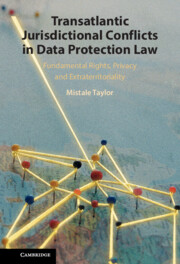 Transatlantic Jurisdictional Conflicts in Data Protection Law
Transatlantic Jurisdictional Conflicts in Data Protection Law Published online by Cambridge University Press: 06 April 2023
One manifestation of tensions around the reach of EU jurisdiction is the US–EU Passenger Name Record (PNR) Agreement. The PNR Agreement provides guidance on processing and transferring EU individuals’ airline passenger data to the US Department of Homeland Security (DHS) for counterterrorism and security purposes. As the DHS does not apply the equivalent data protection standards to EU individuals’ personal data in the US as in the EU, however, the EU has continually renegotiated the Agreements, thereby increasing the territorial reach of its data protection law to enhance protection. Nonetheless, a territorial link between the EU and its exercise of jurisdiction, as well as a nationality-based link, suggest the EU has the authority to prescribe the law pertaining to its individuals’ PNR data transferred to the DHS. Through the PNR Agreement, the EU has managed to raise protection levels for all PNR data everywhere. EU authorities should push for the US–EU PNR Agreement to better protect its individuals’ data protection rights. If incorporated into the Agreement, this could be seen as a necessary form of legal diffusion of EU data protection standards beyond its borders.
To save this book to your Kindle, first ensure no-reply@cambridge.org is added to your Approved Personal Document E-mail List under your Personal Document Settings on the Manage Your Content and Devices page of your Amazon account. Then enter the ‘name’ part of your Kindle email address below. Find out more about saving to your Kindle.
Note you can select to save to either the @free.kindle.com or @kindle.com variations. ‘@free.kindle.com’ emails are free but can only be saved to your device when it is connected to wi-fi. ‘@kindle.com’ emails can be delivered even when you are not connected to wi-fi, but note that service fees apply.
Find out more about the Kindle Personal Document Service.
To save content items to your account, please confirm that you agree to abide by our usage policies. If this is the first time you use this feature, you will be asked to authorise Cambridge Core to connect with your account. Find out more about saving content to Dropbox.
To save content items to your account, please confirm that you agree to abide by our usage policies. If this is the first time you use this feature, you will be asked to authorise Cambridge Core to connect with your account. Find out more about saving content to Google Drive.